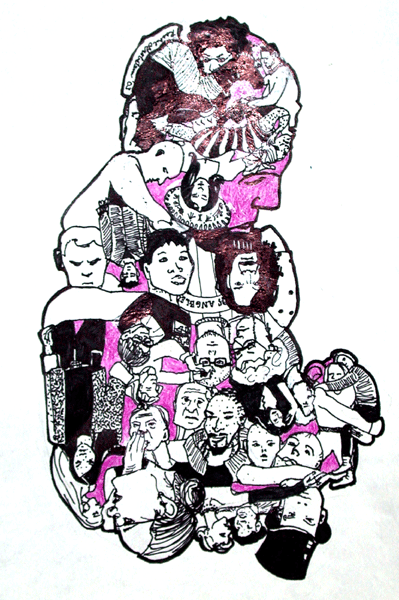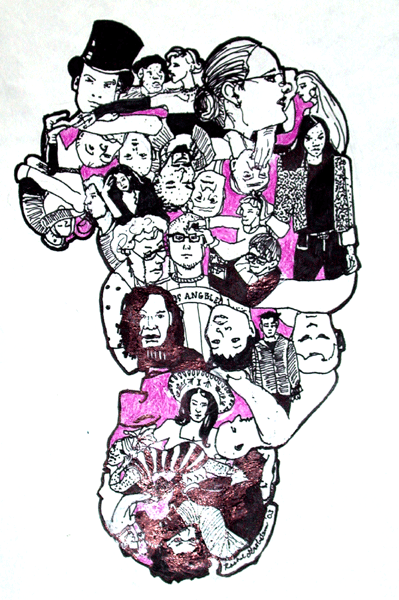Made available on Serendip
In association with Making Sense of Diversity: An Exploration, a world wide conversation

|
November 11, 2005
Elle Endre-Stacy, Chris MacDonald-Dennis, and Rachel Robbins
"The Politics of Sexual Orientation"
Participants
Summary
Prepared by Vanessa Christman
Additions, revisions, extensions are encouraged
in the
On-Line Forum
| 
|
Chris began the conversation providing context for his involvement with the politics of sexual orientation. He'd begun by affiliating himself with organizations such as ACT UP. There followed an era of “post-gay,” but after Matthew Shepard died, being labeled gay took on new/renewed significance. Chris was joined by Rachel and Elle, who spoke about the choices and consequences of how you identify or do not identify. They asked, “What does it mean to be political?”
Visibility and impact on others. While some found it “terrifying” that who you're attracted to can be political, if we accept that skin color and gender are political, perhaps sexual orientation needs to be seen that way too.
Is sexual orientation political now? There is more visibility, more tolerance of gays, lesbians and bisexuals now, but being visible becomes a political statement even without wanting it to.
It was suggested that the term political has something to do with oppression. Does political (as opposed to personal) mean impacting on other people? Both by choice and by force? For example, it can be chosen for you to be political if you've been assaulted.
To what degree does one have a choice about impact on others? If one is sitting in a park, for example, holding hands with a same-sex partner, has one chosen to impact others? Is that a political act? And is it a political act to hold hands in public with an opposite-sex partner? Is heterosexual behavior political? It could be suggested that sexuality (unless one is exclusively auto-erotic) always has an effect on at least one other person. However, there is a power structure in place, and that has some impact on the politicization of certain actions.
There was a brief discussion of “normal”—when one is different from the norm—and whether this in itself is political. One student stated that she would prefer “it” (being gay, lesbian or bisexual and being public about relationships) to have less meaning and to subject one to less scrutiny. Then there was the question of safety if one is different from the surrounding culture.
Separation of the personal and political. Where do we want to get to, as gay, lesbian and bisexual people? As allies of these people? As a society? We should work toward the personal being acceptable without the political.
Some people have not wanted to be political, but they realize others will react to their actions. But does what makes us happy have to become activism?
It was put forward that Thomas Becket, Archbishop of Canterbury, declared one had the right not to be political. (Others pointed out that Becket died for this and other views!) People then questioned, “Can privilege be defined as not having to be political?” And to what extent do we benefit from others who have been political? From others' earlier political actions?
And on the extreme end of privilege, how can someone feel so entitled as to be able to torment, to harass others?
Do we need to protect the personal from the political? “If I'm always on stage,” someone asked, “who am I as a human being?”
What does it mean to be silent? How about to be silenced? Are both political?
Even in interactions with one's parents, is silence best for their sake and for one's own? Compare this to the National Day of Silence, where the silent voices, the voices not present are powerful.
The intentional and the unintentional, it was stated, both have political consequences.
There oughta be a law. Every action can be seen as political, as having consequences for others. But the privileged often are not punished for their actions; there don't seem to be consequences for them. What is the role of allies? Can they be punished for being in relationship with the “other”? For example, is the daughter of a lesbian ridiculed by her peers?
If we can accept that everything we do has social consequences, accept that and move forward, then our commitment should be to make sure people aren't beaten up for who they are.
If we believe laws will defend us, we must nevertheless ask, “When do the laws get written? By whom?” For example, recently there has been a political movement to alter laws around gay marriage. This is, necessarily, political. But the right to be with whom we choose, that is personal. Who you are can be seen as political if it is in opposition to the rules, such as being an out lesbian in the Girl Scouts. It can also be seen as political if you hide who you are
It was mentioned that Jimmy Carter said recently that he supports a civil union for gays and lesbians, so that they can obtain political and social benefits. Marriage, he believes, should be for churches to decide. That would be a true separation of church and state.
Michael Warner's book The Problem with Normal was cited, and it was felt that there needs to be room not to replicate problematic structures.
The discussion concluded with an invitation to help paint the mural at the Women's Center on December 3. The Women's Center, now under development, hopes to be a place for discussion and support, like the MCC.
Discussion continues in the on-line forum on "Making Sense of Diversity," and will resume in person on Friday, November 18, when Florence Goff and Karen Tidmarsh facilitate a conversation entitled “Examining Our History: Inclusion/Exclusion at BMC.”
| Return to Schedule for Friday Noon Conversations

| Bryn Mawr Conversations
| Archived
Forum
| Archive of Bryn Mawr Conversation
| General Conversation
| Serendip Home |
These pages are sponsored by the Bryn Mawr College Office
of Intercultural Affairs, the Center for Science and Society and the Serendip
website. Send us additional comments or suggestions at Serendip
© by Serendip 1994-
- Last Modified:
Wednesday, 21-June-2005 15:18:00 EST

